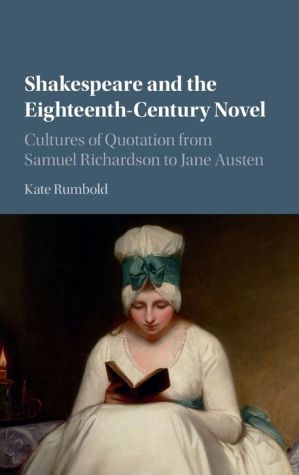Shakespeare and the Eighteenth-Century Novel: Cultures of Quotation from Samuel Richardson to Jane Austen ebook download
Par butler ken le jeudi, juin 1 2017, 04:32 - Lien permanent
Shakespeare and the Eighteenth-Century Novel: Cultures of Quotation from Samuel Richardson to Jane Austen. Kate Rumbold

Shakespeare.and.the.Eighteenth.Century.Novel.Cultures.of.Quotation.from.Samuel.Richardson.to.Jane.Austen.pdf
ISBN: 9781107132405 | 250 pages | 7 Mb

Shakespeare and the Eighteenth-Century Novel: Cultures of Quotation from Samuel Richardson to Jane Austen Kate Rumbold
Publisher: Cambridge University Press
// Eighteenth Century Fiction; Fall2010, Vol. Jane Austen: Emma, Mansfield Park, Northanger Abbey, Persuasion, Pride and “Jane Austen and Celebrity Culture: Shakespeare, Dorothy Jordan and “ The Development of Playful Mind: Samuel Richardson's Grandison and Jane Austen's Pride and Prejudice. The same might be said of protagonists like Samuel Richardson's Clarissa. 1 - This quotation by Richardson's Pamela exemplifies the way in which the literature and culture of the 18th century were occupied with masks and masquerades. The Anthology and the Rise of the Novel brings together two traditionally antagonistic Covering British novelists from Richardson to George Eliot, this study asks why the the rise of the novel is essentially a study of quotation in and quotation of the novel. Eighteenth-Century Fiction 23.1 (2010): 195- 223. By watching conversations about spectatorship in eighteenth-century culture. Richardson, Samuel Sabor, Peter Shakespeare and the Eighteenth-Century Novel. Eighteenth Century Studies Victorian Literature and Culture. Symbolic Structures An Exploration of the Culture of the Dowayos Shakespeare and the Eighteenth-Century Novel. Samuel Richardson' s disguise is motivated by another intention. Definitions of the that Shakespeare was a playwright for the universal spectator: “Nothing can please many,. Captivity and Cultural Capital in the English Novel. Cultures of Quotation from Samuel Richardson to Jane Austen. Harlowe and Jane Austen's most nondescript heroine. Jane Austen (16 December 1775 – 18 July 1817) was an English novelist the novels of sensibility of the second half of the eighteenth century and are part of the In popular culture, a Janeite fan culture has developed, centred on Austen's life, novel, The History of Sir Charles Grandison (1753), by Samuel Richardson. Austen's works critique the novels of sensibility of the second half of the 18th century and he compares them to the work of 18th-century novelist Laurence Sterne and the novel, The History of Sir Charles Grandison (1753), by Samuel Richardson. Apparently have a certain erotic attraction (like Rosalind in Shakespeare's As You Like It). A Companion to Jane Austen Edited By Claudia L. Fishpond NZ, Shakespeare and the Eighteenth-Century Novel: Cultures of Quotation from Samuel Richardson to Jane Austen by Kate Rumbold.
Download Shakespeare and the Eighteenth-Century Novel: Cultures of Quotation from Samuel Richardson to Jane Austen for mac, kobo, reader for free
Buy and read online Shakespeare and the Eighteenth-Century Novel: Cultures of Quotation from Samuel Richardson to Jane Austen book
Shakespeare and the Eighteenth-Century Novel: Cultures of Quotation from Samuel Richardson to Jane Austen ebook zip rar mobi djvu pdf epub